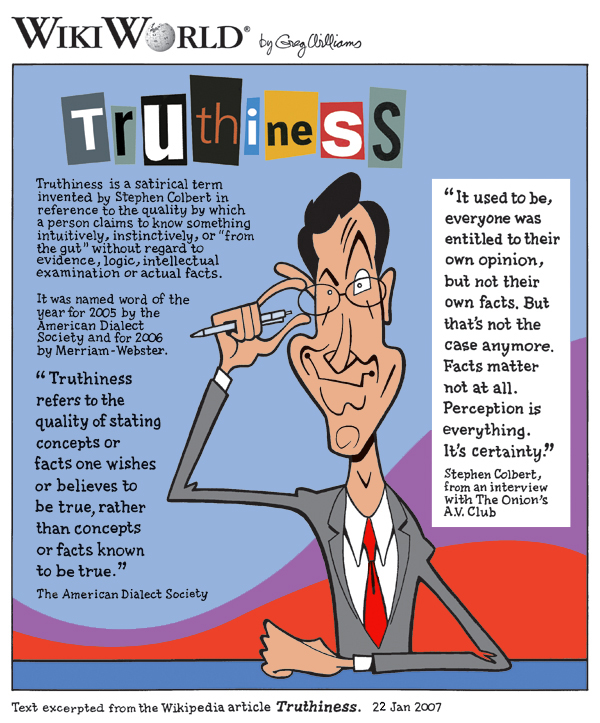
The comedian Stephen Colbert and Wikipedia have a complicated relationship. The two are very different, of course—one has an army of supporters, has received multiple awards, and is generally beloved by the Internet. The other is Stephen.
As far as we know, Wikipedia and Stephen first met publicly in July 2006. Wikipedia was in the midst of a massive growth spurt; it had surpassed one million articles only two months before. Colbert was still in the early months of his own satirical news show, The Colbert Report (a spin-off of the The Daily Show), and had recently performed a controversial set at the 2006 White House Correspondents’ Association Dinner.
On July 31, 2006, Colbert took aim at Wikipedia during his “The Wørd” segment. His new neologism of the night was “wikiality”—in essence, truth by consensus.
| “ | You see, any user can change any entry, and if enough other users agree with them, it becomes true. … If only the entire body of human knowledge worked this way. And it can, thanks to tonight’s word: Wikiality. Now, folks, I’m no fan of reality, and I’m no fan of encyclopedias. I’ve said it before. Who is Britannica to tell me that George Washington had slaves? If I want to say he didn’t, that’s my right. And now, thanks to Wikipedia, it’s also a fact. We should apply these principles to all information. All we need to do is convince a majority of people that some factoid is true. … What we’re doing is bringing democracy to knowledge. | ” |
He called on his viewers to go to Wikipedia’s entry on elephants and edit it to note that the animal’s population in Africa had tripled in the last six months, and they did so. Wikipedia editors were still dealing with vandalism from Colbert’s call days later—and one-off cases continued for months. The cleanup extended to wholly unrelated articles like Elefant (band) as well.
In fact, an editor going by the name “Stephencolbert” was blocked for making two edits mentioned on the show hours before it aired, possibly during taping. It is not known whether this was Colbert himself, or an opportune audience member, although he did mention (3:13 and reply) being ‘blocked for vandalism’ in a 2007 interview with Wikipedia founder Jimmy Wales.
Three days later, he returned to the topic of Wikipedia, claiming that “Latchkey kids are more likely to be crazy, I read it on Wikipedia. Look it up.” A Wikipedia administrator watching the show knew what was coming and protected the article on latchkey kids within fifteen seconds.
Thus began the Colbert-Wikipedia relationship, and we returned the attention. In the month after “wikiality” debuted, the article on the Colbert Report was edited more than 800 times and at times even had separate sections for wikiality and “truthiness,” another term popularized by Colbert.
In January 2007, he took on the site directly for an early and controversial case of paid editing. When Microsoft offered to pay an Australian programmer to help “balance” articles on two file formats, Colbert responded by coining the word “wikilobbying,” or “when money determines Wikipedia entries, reality has become a commodity.”
Colbert perhaps did not know how prescient his words would be. Just this week, seasoned Wikipedia administrators banned nearly 400 user accounts for “black hat” actions—or making promotional edits to articles, without disclosing their conflict of interest. In this case, Wikipedia editors agree with Colbert. Wikipedia is not a commodity, and its integrity is not for sale.
Over the years, Colbert has come back to Wikipedia several times—in fact, Wikipedia has a full article section dedicated to Colbert’s attention to the site. During his interview with Jimmy Wales, Colbert admitted that he thought Wikipedia was “an amazing thing, the first place I go when I’m looking for knowledge” before slipping back into to character to add, tongue-in-cheek, “when I want to create some.”
Stephen, you tried to claim that you’re no fan of encyclopedias. We knew better. Good luck on the new show, and we’ll be there to protect the sum of all knowledge when you next decide to talk about us.
Ed Erhart, Editorial Associate
Wikimedia Foundation

Can you help us translate this article?
In order for this article to reach as many people as possible we would like your help. Can you translate this article to get the message out?
Start translation